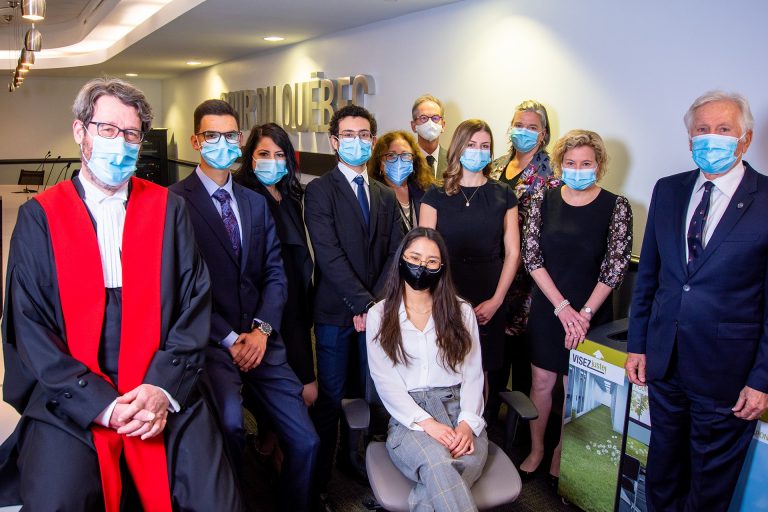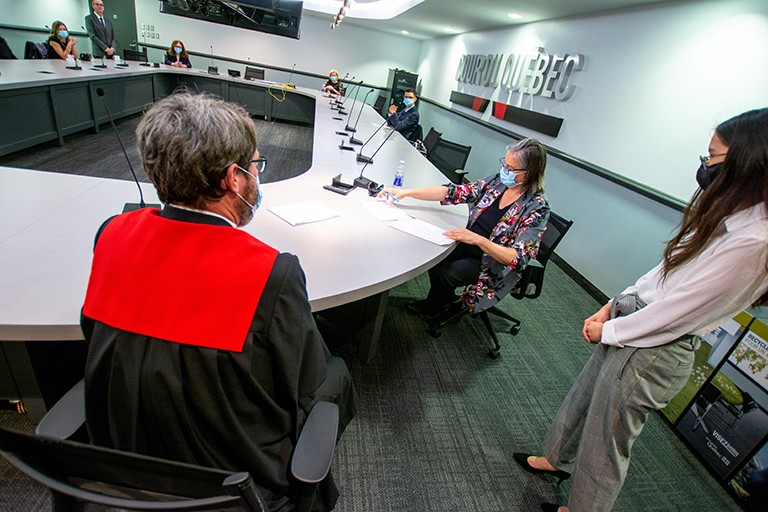Concordia Law and Society program students get an up-close look at the justice system

The first group of students participating in Concordia’s Court of Quebec program were recognized at an official ceremony at the Montreal courthouse on May 3. They each received certificates of achievement signed by Pascale Sicotte, dean of Concordia’s Faculty of Arts and Science, and the Honourable Scott Hughes, Senior Associate Chief Justice of the Court of Quebec.
“Despite the barriers brought on by the COVID-19 pandemic, students and participating judges completed the first year of the program,” says Concordia jurist-in-residence Morton Minc (BA 67). “I am thrilled that we get to celebrate the students’ achievements and I have no doubt that the experience will stay with them for a lifetime.”
Minc developed the program in partnership with the Court of Quebec to give students the opportunity to observe the justice system firsthand.
Participants attend hearings, discuss cases and absorb the courtroom environment with guidance from seasoned judges.
“It’s a true behind-the-scenes experience,” describes Gelu Balan, a political science major with a minor in law and society. “With every actor in the courtroom changing from day to day — the judges, the lawyers and the accused — the courtroom environment is extremely dynamic and even sometimes chaotic.”
It can also be profound, says Balan. He describes moments he witnessed peoples’ lives change, for better or worse.
“This is a serious business, and not only for the perpetrator or the accused, but for the people who make the decisions. Judges have an immense duty on their hands.”
Balan knew this opportunity would allow him to gain unique skills and experiences he otherwise wouldn’t have access to. “It’s a must for people who are interested in criminal law,” he says.
Graduating this June, Balan has been accepted into McGill University’s law program for the fall, which he credits to a newfound understanding, inspiration and respect for the legal profession made possible by the Court of Quebec program.

‘A better understanding of issues we face as a society’
Quebec Court Judge Annie Savard, who is participating in the program, can relate to Balan’s experience.
“When I was in university, I also had the opportunity to go to court and loved it so much that I continued on to the Department of Youth Protection and, now, the Youth Division,” Savard says.
“Regardless of what career path students ultimately choose, this program offers a better understanding of all the issues we face as a society: violence, mental health, racial tension. It also allows them to better understand the situation of vulnerable people and exposes them to psychological and social issues.”
After completing the Court of Quebec program, third-year history major Maire Dowdall is more motivated than ever to attend law school in the future.
“The lawyers and judges I met are incredibly hard-working professionals,” she says. “They’re dedicated to every case. I admire these as qualities and hope to cultivate them for myself one day.”
Dowdall’s interest in history and criminal law motivated her to register for a minor in law and society, then to apply for the Court of Quebec program. She agrees with Balan that there’s no typical day in court. “But that’s part of the fun.”
Witnessing trials and getting face time with a judge was a unique opportunity too good for Dowdall to pass up. “It’s really incredible that this program exists at the undergraduate level for Concordia students who aren’t even in law,” she says.
On top of developing her critical thinking and attention to detail, the program gave her a newfound appreciation for decorum and discipline. “All these competencies are super useful in my professional and personal life,” Dowdall adds.
“Getting involved on the front line and witnessing the backroom are powerful experiences,” explains Court of Quebec Judge Stéphane Davignon, another contributor to the program. “It’s about going beyond what’s seen and heard up front to truly understand what questions are at stake, how we render decisions and what exactly needs to be decided.”
Learn more about Concordia’s Jurist-in-Residence program.


